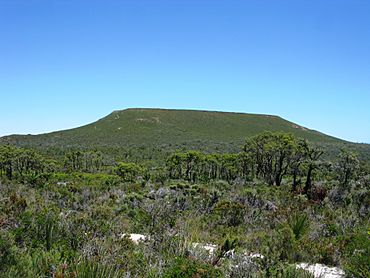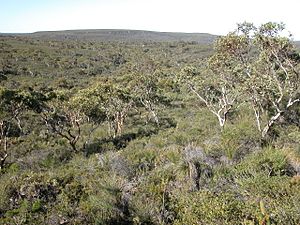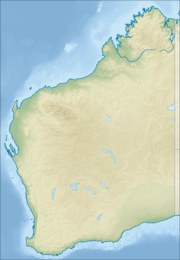Lesueur National Park facts for kids
Quick facts for kids Lesueur National ParkWestern Australia |
|
|---|---|
|
IUCN Category II (National Park)
|
|
 |
|
| Nearest town or city | Jurien Bay |
| Established | 1992 |
| Area | 272.35 km2 (105.2 sq mi) |
| Managing authorities | Department of Environment and Conservation |
| Website | Lesueur National Park |
| See also | List of protected areas of Western Australia |
Lesueur National Park is a special protected area in Western Australia. It's about 211 kilometers (131 miles) north of Perth. The park sits where the Wheatbelt and Mid West regions meet.
This national park was officially created in 1992. It is home to two flat-topped hills called mesas: Mount Lesueur and Mount Michaud. The park is famous for its amazing variety of plants.
Contents
Discovering Lesueur's Unique Plants

Lesueur National Park is part of a special area called the Geraldton Sandplains bioregion. This area is known for its scrubby heathland. It has many plants from the Proteaceae family, which includes plants like banksias and grevilleas.
The plants in the park grow in many different ways. You can find patches of woodland mixed in with areas of shrubland. This mix creates a complex environment for all the different species.
Many Plant Species Thrive Here
There are over 900 different types of native plants in Lesueur National Park. Many of these plants are endemic, meaning they are found only in this park and nowhere else in the world!
Some of the rare or threatened species you might find include the Mount Lesueur Grevillea, Forrest's Wattle, the Lesueur Hakea, and the Laterite Mallee. These plants are very important to protect.
Special Trees of the Park
Lesueur National Park is the northernmost place where you can find Jarrah and Mountain Marri trees. Usually, these trees grow very tall. However, in this park, they grow as smaller, shrubby plants called mallees. This shows how plants can adapt to different environments.
Protecting the Plants from Disease
The park's plants face a threat from a disease called Phytophthora dieback. This disease kills plants and can spread easily through infected soil or water. Efforts are made to stop its spread and protect the park's unique plant life.
See also
 In Spanish: Parque nacional Lesueur para niños
In Spanish: Parque nacional Lesueur para niños
 | Frances Mary Albrier |
 | Whitney Young |
 | Muhammad Ali |


